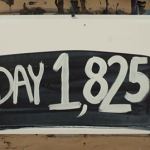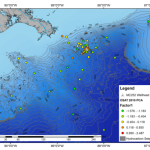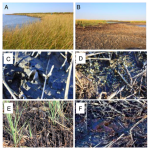Seeing as I seem to be living, eating and breathing this Gulf Oil Spill (figuratively, I hope, although the proximate air of New Orleans air and delicious shrimp po’boys may actually mean I am speaking literally), I bring you a special Sunday Spill Roundup.
Today, a day shy of five months, BP finally announced that–ding dong the wicked ol’ well is dead! ‘Bottom-kill’ worked and the hardened cement in the blown-out well passed all tests with flying colors.
In a stark contrast to this good news, today’s Times-Picayune had a very ominous story on the cover, which I came across while eating my scrumptious breakfast at Surrey’s Café (seriously—go eat there if you are in New Orleans. Unbelievable!). Oil appears to be effectively trapped in the Gulf ecosystem, continuing to wash up on beaches as ocean currents mix and erode sediments. I’d heard rumours of the oil just being ‘buried’ as opposed to being completely cleared from beaches, and this story appears to confirm this situation at least at Fourchon Beach in southern Louisiana:
Beach retreat — erosion to the north — averages about 46 feet per year here, Norman said. That rate hasn’t paused during the spill, so oil that landed on the beach and wasn’t collected immediately often became submerged by the Gulf within days. “You come out one day and it looks like the beach was cleaned overnight, but what you’re seeing, really, is new beach, because the beach that was here a few days ago — and the oil that was on it — is now under the water and covered with new sediment and sand” Travirca said. “But it doesn’t stay gone. When we get rough weather, that sediment containing the oil gets picked up pushed back up on the new beach. Some of it is exposed, some of it is buried again.”
In contrast to my previous post about the seemingly hunky-dory situation for surface waters, I’ve had a different experience on beaches over the last few days. The oil is all too easy to find—from small droplets in the sand to huge patches of fluffy, weathered oil foam. I’ve now been to beaches all along the Alabama to Mississippi coast; usually the beaches that were the cleanest (and where cleanup crews were still visibly present) were the public, sandy beaches like Biloxi. The muddy or out-of-the-way places definitely don’t seem to be getting the same loving care. Here are some pictures I took yesterday:
I’m finding it all very sickening and horrible to see first hand. Can someone please invent a hovercraft already so I can switch to a more guilt-free method of transportation?






It is because if it gets deep enough on the floor of Florida, it will eventually absorb into the water table, murdering our fresh water sources as well. Springs, Wells, everything- THEY ARE HITLERS INCARNATE!!! This is the worst CRIME since the holocaust. Millions will be sick soon and well quite frankly, it will be cheaper to KILL ALL OF THE SICK as opposed to pay them settlements. A few will get settlements as shown by the recent payouts from BP. But this will soon all end.
It doesn’t matter since they’ll KILL US ALL with smallpox dropped in chemtrails long before that happens.
Or maybe the aliens will come.